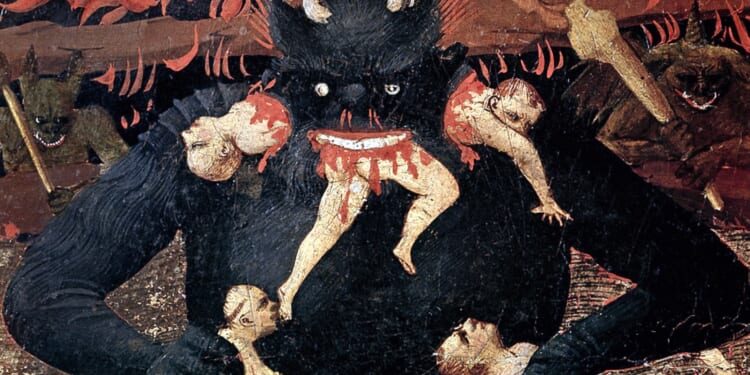Every few years, I reread a couple of my favorite authors. George Orwell, despite his disdain for things Catholic, has always been on my list. This time I paid special attention to his essay, “The Principles of Newspeak.” He appended it to his dystopian novel 1984. As Orwell noted in his text, Newspeak – the language of Oceania’s Airstrip One (formerly the UK) – had three distinct vocabularies; A, B, and C. The B vocabulary “had been deliberately constructed for political purposes.” Its words “had, in every sense, a political implication.” They were designed to impose a desired mental attitude upon the user.
A perfect such B-word was duckspeak. It meant “to quack like a duck.” Ultimately, for Newspeak’s linguists:
it was hoped to make articulate speech issue from the larynx without involving the higher brain centers at all. . . .[Thus, like] various other words in the B vocabulary, duckspeak was ambivalent in meaning. Provided that the opinions which were quacked out were orthodox ones, it implied nothing but praise, and when the Times referred to one of the orators of the Party as a doubleplusgood duckspeaker, it was paying a warm and valued compliment.
On the other hand, duckspeak could also be used to describe and vilify any opinion seen by the Party as crimethink. In effect, words meant whatever, and only whatever, the Party wanted them to mean in any given circumstance.
The other author I’ve returned to this year is the philosopher, Augusto Del Noce. After flirting with the Italian Left as a young man, Del Noce later reverted to his Catholic faith. In the aftermath of World War II until his death in 1989, he wrote a series of brilliant reflections (collected here and here) critiquing Marxist thought, technological civilization, the sexual revolution, progressive politics and theology, and the emerging contours of the postmodern world.
Of special interest, given our current environment, is his essay from the late 1960s, “On Catholic Progressivism.” In it, he argued that:
[W]hereas a discussion with a rigorously Marxist intellectual is possible, it is not so with a Catholic progressive. Not because we despise him, but because he despises his critic, treating him already from the start as somebody who stops at mere formulaic intellectualism. Therefore, one does not discuss with a Catholic progressive, but in front of him, just hoping that our arguments may provide an opportunity to stimulate his critical reflection.
If Del Noce’s frustration sounds familiar, it should. Internal Catholic debate has been fractious since the close of Vatican II, with renewed tension in the last 12 years. Whatever its strengths, the Francis pontificate, despite its purported openness, was the most authoritarian in more than a century, resistant to even faithful criticism, loose in matters of Church law, and marked by a studied ambiguity in various issues of doctrine.
We now have a new pope who’s taken the name “Leo.” His predecessor, Leo XIII, worked tirelessly to bring the modern world into line with eternal principles through his personal leadership and encyclicals like Rerum Novarum. We can hope that Leo XIV will do the same. We need that kind of faithful leadership urgently, because per Del Noce’s essay above, today’s Catholic progressivism – renascent during the Francis years – represents the “exact inverse” of Leo XIII’s efforts. In contrast, it seeks “to bring Catholicism into line with the modern world.”

This is most obvious in, but not limited to, matters of sexuality. There’s a gulf between respecting persons with same-sex attraction and their God-given dignity, and affirming morally destructive sexual behaviors. Channeling Del Noce at Rome’s 2018 synod of bishops, Archbishop Charles Chaput, among others, stressed that “what the Church holds to be true about human sexuality is not a stumbling block. It is the only real path to joy and wholeness.”
He went on to argue that:
There is no such thing as an “LGBTQ Catholic” or a “transgender Catholic” or a “heterosexual Catholic,” as if our sexual appetites defined who we are; as if these designations described discrete communities of differing but equal integrity within the real ecclesial community, the body of Jesus Christ. This has never been true in the life of the Church, and is not true now. It follows that “LGBTQ” and similar language should not be used in Church documents, because using it suggests that these are real, autonomous groups, and the Church simply doesn’t categorize people that way.
Yet this is precisely the divisive and misleading language that today’s cultural Left, within and outside the Church, seeks to use.
So what’s the point of all the words above?
Just this: The Devil is real. And he’s not some cartoonish, leathery imp. If you want a sense of angelic grandeur and power, even in its corrupted state, read Rilke’s poem, “The Angels.” That’s the kind of creature, outside space and time, his genius and beauty poisoned by his own sin of pride, who hates the human race and seeks to infect us with exactly his same hatred of Creation and incarnate life.
Given the industrial-scale mass murders of the last century, he’s batting 1.000. The only “mystifying” thing about Satan is how many people refuse to believe in him. Which, of course, suits his purposes very well. We find him now in the brainless quacking of our political discourse (Fascist! Racist! Hater!), in the duckspeak of our mass media, in the disguised cynicism of our behavioral sciences, in the toxic misuse of our sexuality, in our indifference to the weak and suffering, and in the mutilation of our bodies, which God became Man to redeem.
October slides smoothly toward the Halloween freakshow on our neighbor’s front lawn. It’s an odd month, filled with witches and goblins and odd thoughts like these. But it reminds me that in the end, maybe in every age, we only really have one choice: duckspeak, in all its many forms and vocabularies, or speaking the truth in love.











